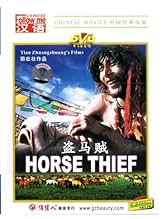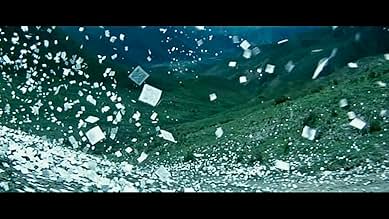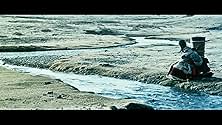NOTE IMDb
6,8/10
1,7 k
MA NOTE
Ajouter une intrigue dans votre langueA Tibetan man struggles to provide for his family.A Tibetan man struggles to provide for his family.A Tibetan man struggles to provide for his family.
- Réalisation
- Scénario
- Casting principal
- Récompenses
- 1 victoire au total
Avis à la une
I cannot help thinking that Tian Zhuangzhuang is not only the least appreciated of the great contemporary Chinese directors, but also the least talented - his films (that is, the three that I have seen) made a lesser impression on me than, let's say, the works of Jia Zhangke or the nineties' output of Zhang Yimou.
"Lan feng zheng" (The Blue Kite), a socio-critical portrait of life in Communist China, seems a bit too static in its quiet, sober realism, with the director's continuous effort to charge Maoism tending to veil everything else ; only in the last segment the movie became truly touching for me.
In "Xiao cheng zhi chun" (Springtime in a Small Town) a couple of characters are, zombie-like, dragging past ornamental decorations of dilapidating claustrophobic interiors, or alternately walking on ruins of an ancient city wall ; I found this hardly anything more than a rather boring, banal quasi-Chekhovian étude.
The last - in fact, the oldest - of the three, "Dao ma zei" (The Horse Thief), is quite different. Minimalistic in plot and dialogues, it might be described as a sort of ethnographic documentary with touches of folk ballad : lyrical cinema close to some works of the Armenian Parajanov, albeit, to my regret, lacking his emotional power. Tibetan nature is the vamp of the movie, local religion + magic its core. The former I do savour, the latter I struggle to grasp, owing to the fact that my knowledge of it is considerably limited.
The last reason why I don't praise "The Horse Thief" as Scorsese did, may lie in the quality of the Chinese region-free disc (gzbeauty). Nevertheless, the non-anamorphic image from an old print, dirty and scratched, is better than I expected. It can be zoomed to proper OAR 2,35:1 on my player, though there's no room for subtitles then. For second viewing, they are not necessary anyway.
For those who liked "The Horse Thief" but felt deprived of the epic/action element, I would recommend "Kekexili" (Mountain Patrol) by Tian's compatriot Lu Chuan.
"Lan feng zheng" (The Blue Kite), a socio-critical portrait of life in Communist China, seems a bit too static in its quiet, sober realism, with the director's continuous effort to charge Maoism tending to veil everything else ; only in the last segment the movie became truly touching for me.
In "Xiao cheng zhi chun" (Springtime in a Small Town) a couple of characters are, zombie-like, dragging past ornamental decorations of dilapidating claustrophobic interiors, or alternately walking on ruins of an ancient city wall ; I found this hardly anything more than a rather boring, banal quasi-Chekhovian étude.
The last - in fact, the oldest - of the three, "Dao ma zei" (The Horse Thief), is quite different. Minimalistic in plot and dialogues, it might be described as a sort of ethnographic documentary with touches of folk ballad : lyrical cinema close to some works of the Armenian Parajanov, albeit, to my regret, lacking his emotional power. Tibetan nature is the vamp of the movie, local religion + magic its core. The former I do savour, the latter I struggle to grasp, owing to the fact that my knowledge of it is considerably limited.
The last reason why I don't praise "The Horse Thief" as Scorsese did, may lie in the quality of the Chinese region-free disc (gzbeauty). Nevertheless, the non-anamorphic image from an old print, dirty and scratched, is better than I expected. It can be zoomed to proper OAR 2,35:1 on my player, though there's no room for subtitles then. For second viewing, they are not necessary anyway.
For those who liked "The Horse Thief" but felt deprived of the epic/action element, I would recommend "Kekexili" (Mountain Patrol) by Tian's compatriot Lu Chuan.
After hearing Martin Scorsese declare Horse Thief as the #1 film of the 90s (actually released in 1987) when co-hosting the annual "Best of" show with Roger Ebert, I set out to see this film. Luckily, there was a copy available in the library. Unfortunately, the library would not allow me to take it home. So, I was stuck watching this film on a 10 inch screen television in a cramped cubicle with uncomfortable headphones crushing my ears. Obviously, this was not the way that Tian intended his film to be viewed.
Tian Zhuangzhuang's third feature, Horse Thief, is essentially dialogue-free and is rather slim on plot. The film is reminiscent of the silent-era when directors were capable of manipulating the camera to communicate their desired idea. Basically, the film centers on the banishment of Norbu (forcefully personified by Rigzin Tseshang in an astonishing debut), a local horse thief, and his wife and son. Norbu gives up stealing horses for his wife and sets out to find a more respectable profession. When times get rough, Norbu is confronted with the reality that he must steal again to save his family from the harsh, unforgiving winter.
Tian's film has a striking realistic quality to it that plays like a documentary. In one scene, we are given the chance to watch a ritualistic ceremony designed to please the mountain god. While this scene evokes awe, some scenes may be seen as quite offensive. For example, Norbu comes up behind an unsuspecting lamb and slits its throat. The viewer is forced to watch the animal writhe and thrash agonizingly struggling for its last breaths. This scene, although I cannot deny its accuracy and technical beauty, is distressing to watch. The reality of this scene is not achieved through use of mechanical animals and fake blood; it is achieved by the actual killing of a lamb for the production of this film. Aside from this painfully unpleasant section, Tian's cinematic mastery is thoroughly evident.
Because of the deficient viewing conditions, I was only able to catch a glimpse of Tian's overwhelmingly glorious cinematography: Norbu dolefully places his son's dead body in the middle of a snow-covered meadow for the gods to take. In deep focus, the camera slowly reveals Norbu's utter aloneness and emptiness. In this one shot, Tian has created cinematic perfection.
Tian Zhuangzhuang's third feature, Horse Thief, is essentially dialogue-free and is rather slim on plot. The film is reminiscent of the silent-era when directors were capable of manipulating the camera to communicate their desired idea. Basically, the film centers on the banishment of Norbu (forcefully personified by Rigzin Tseshang in an astonishing debut), a local horse thief, and his wife and son. Norbu gives up stealing horses for his wife and sets out to find a more respectable profession. When times get rough, Norbu is confronted with the reality that he must steal again to save his family from the harsh, unforgiving winter.
Tian's film has a striking realistic quality to it that plays like a documentary. In one scene, we are given the chance to watch a ritualistic ceremony designed to please the mountain god. While this scene evokes awe, some scenes may be seen as quite offensive. For example, Norbu comes up behind an unsuspecting lamb and slits its throat. The viewer is forced to watch the animal writhe and thrash agonizingly struggling for its last breaths. This scene, although I cannot deny its accuracy and technical beauty, is distressing to watch. The reality of this scene is not achieved through use of mechanical animals and fake blood; it is achieved by the actual killing of a lamb for the production of this film. Aside from this painfully unpleasant section, Tian's cinematic mastery is thoroughly evident.
Because of the deficient viewing conditions, I was only able to catch a glimpse of Tian's overwhelmingly glorious cinematography: Norbu dolefully places his son's dead body in the middle of a snow-covered meadow for the gods to take. In deep focus, the camera slowly reveals Norbu's utter aloneness and emptiness. In this one shot, Tian has created cinematic perfection.
Among Chinese "Fifth Generation" film directors, the name Tian Zhuangzhuang might not sound as resounding as his classmates Zhang Yimou or Chen Keige, both internationally and domestically, principally because his two most famous works THE HORSE THIEF (1986) and THE BLUE KITE (1993) are both under heavy censorship for pluckily tackling the hot buttons, the Tibetan ethnic minorities and the adverse affect of the Culture Revolution, respectively. Tian's directorial endeavor has reached a standstill since 2009, after the flop THE WARRIOR AND THE WOLF (2009). With 11 features and 1 documentary under his bet, he, has since reinvented himself as an actor, giving consecutive affecting performances in two films made by female directors, Sylvia Chang's LOVE EDUCATION (2017) and her protégée Rene Liu's directorial debut US AND THEM (2018), awarded with coveted GOLDEN HORSE Awards nominations.
Made between Chen's groundbreaking YELLOW EARTH (1984) and Zhang's spectacular RED SORGHUM (1988), THE HORSE THIEF, already Tian's third feature, reverently lifts the veil of the myth around Tibet and deploys a cinéma-vérité guideline in peering through the mores of its denizens - mostly through their religious rituals (profuse with prayer wheels, floating prayers, as well as clinquant temples) and quotidian activities (a haunting living sheep burying sequence and the displacement caused by a plague) - and relishes in the sublime, pristine natural and architectural landscape, the seasonal changes in the Qingzang Plateau, the Roof of the World, from verdant green to an overwhelming snow white.
Opening and closing with authentic scenes of celestial burials, which signifies an ouroboric Buddhist transcendence, the film's elliptical narrative loosely hinges on the titular thief Norbu (Tseshang), whose contravention takes its toll when he and his nuclear family is punished into exile in 1923, bereavement and poverty will assail him and wife Dolma (Dan), even the blessing of pregnancy doesn't augur well for a family at the end of their tether (underpinned by a chthonic, eery traditional performance of masked deities watched by the couple). Yet, through his minimalist plot, Tian astutely points up the perpetuating conflict in Norbu's illicit métier and his indefatigable piety, who habitually allots a tranche of his haul to the Almighty in order to alleviate his sins, especially when the seeming reckoning is subjected to his young son, Tian masterfully conjures up a series of blue-tinted superimposed sequences manifesting the kowtowing couple's repentance, foreseeing the guilty-driven Norbu's ultimate fate.
Besides Hou Yong and Zhao Fei's mind-blowing photography, Qu Xiaosong's cavernous, otherworldly score is equally substantive in honing up the film's superlative aura of exotica and mystique, only the dubbed Tibetan dialogue sounds a tad dissonant, loud and out of synchronicity, although it is a small triumph since the original mainland theatrical release is histrionically dubbed in Mandarin at the behest of the harsh censorship. More of an ethnic reportage than a compelling exposé, THE HORSE THIEF is the living proof of Tian's humanistic aptitude and profound veneration to the ethnic heritage, not to mention he is also bestowed with a keen eye and a competent hand in finding divine beauty, whose oeuvre is in much exigency of rediscovery.
Made between Chen's groundbreaking YELLOW EARTH (1984) and Zhang's spectacular RED SORGHUM (1988), THE HORSE THIEF, already Tian's third feature, reverently lifts the veil of the myth around Tibet and deploys a cinéma-vérité guideline in peering through the mores of its denizens - mostly through their religious rituals (profuse with prayer wheels, floating prayers, as well as clinquant temples) and quotidian activities (a haunting living sheep burying sequence and the displacement caused by a plague) - and relishes in the sublime, pristine natural and architectural landscape, the seasonal changes in the Qingzang Plateau, the Roof of the World, from verdant green to an overwhelming snow white.
Opening and closing with authentic scenes of celestial burials, which signifies an ouroboric Buddhist transcendence, the film's elliptical narrative loosely hinges on the titular thief Norbu (Tseshang), whose contravention takes its toll when he and his nuclear family is punished into exile in 1923, bereavement and poverty will assail him and wife Dolma (Dan), even the blessing of pregnancy doesn't augur well for a family at the end of their tether (underpinned by a chthonic, eery traditional performance of masked deities watched by the couple). Yet, through his minimalist plot, Tian astutely points up the perpetuating conflict in Norbu's illicit métier and his indefatigable piety, who habitually allots a tranche of his haul to the Almighty in order to alleviate his sins, especially when the seeming reckoning is subjected to his young son, Tian masterfully conjures up a series of blue-tinted superimposed sequences manifesting the kowtowing couple's repentance, foreseeing the guilty-driven Norbu's ultimate fate.
Besides Hou Yong and Zhao Fei's mind-blowing photography, Qu Xiaosong's cavernous, otherworldly score is equally substantive in honing up the film's superlative aura of exotica and mystique, only the dubbed Tibetan dialogue sounds a tad dissonant, loud and out of synchronicity, although it is a small triumph since the original mainland theatrical release is histrionically dubbed in Mandarin at the behest of the harsh censorship. More of an ethnic reportage than a compelling exposé, THE HORSE THIEF is the living proof of Tian's humanistic aptitude and profound veneration to the ethnic heritage, not to mention he is also bestowed with a keen eye and a competent hand in finding divine beauty, whose oeuvre is in much exigency of rediscovery.
Big screen is the only place to see this masterpiece. As the last of the films viewed @ the Detroit Institute of Arts Detroit Film Theatre's Monday Night Series, Horse Thief was fitting to be viewed last: truly the best was saved till last.
A Detroit Free Press reviewer gave the film only 2 stars because of a "sorely needed script". The beauty of this film is exactly that lack of dialogue which leaves room to enjoy the visual feast that the director intended.
I am grateful that the film was allowed out of China at all and privileged to view the beauty of Tibetan culture and Buddhist monk rituals, the inside of a Tibetan temple with rows and rows of flickering candles, the tortured beauty of the mountainous region in summer, spring and winter and the painful, poignant and ultimately tragic tale of a man, his wife and children and their lives in a region of the world that some Americans might only see in the pages of National Geographic.
A Detroit Free Press reviewer gave the film only 2 stars because of a "sorely needed script". The beauty of this film is exactly that lack of dialogue which leaves room to enjoy the visual feast that the director intended.
I am grateful that the film was allowed out of China at all and privileged to view the beauty of Tibetan culture and Buddhist monk rituals, the inside of a Tibetan temple with rows and rows of flickering candles, the tortured beauty of the mountainous region in summer, spring and winter and the painful, poignant and ultimately tragic tale of a man, his wife and children and their lives in a region of the world that some Americans might only see in the pages of National Geographic.
10zzmale
The theme behind this movie is the same as that of Ben Ming Nian (1990) directed by Mr. Fei Xie: criminals trying to go straight but are forced to go back to the old ways for survival due to lack of opportunities.
The theme reflected the problem of current society, and the problem started in the 1980's. As one of his early works and the political climates of China back then, it is understandable that the director adopted the cautious approach by using remote region such as Tibet and time setting that is more than half a century ago. One really needs to acknowledge the problem of current China (and in fact, the problem of many countries), in order to discover the link between the movie and its subtle attempt to criticize the contemporary society.
The theme reflected the problem of current society, and the problem started in the 1980's. As one of his early works and the political climates of China back then, it is understandable that the director adopted the cautious approach by using remote region such as Tibet and time setting that is more than half a century ago. One really needs to acknowledge the problem of current China (and in fact, the problem of many countries), in order to discover the link between the movie and its subtle attempt to criticize the contemporary society.
Le saviez-vous
- AnecdotesNumber 1 on Martin Scorsese's top 10 movies of the 90s list, which he presented on a special episode of At the Movies with Roger Ebert. Even though the movie was made and released in the 80s, it gain traction in the US during the 90s.
- ConnexionsFeatured in Siskel & Ebert & the Movies: Best of the '90s (2000)
Meilleurs choix
Connectez-vous pour évaluer et suivre la liste de favoris afin de recevoir des recommandations personnalisées
- How long is The Horse Thief?Alimenté par Alexa
Détails
Contribuer à cette page
Suggérer une modification ou ajouter du contenu manquant

Lacune principale
By what name was Le voleur de chevaux (1986) officially released in India in English?
Répondre


















